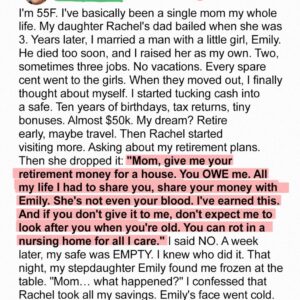Anna, 35, lost her husband Mark just seven months ago. He had divorced his ex-wife, Deborah, years earlier after catching her cheating. Together, they shared a son, Jacob, who is now 20.
After Mark’s funeral, Deborah and Jacob stormed into Anna’s home, taking belongings—including some of Anna’s own things—and demanded that she leave, claiming they planned to sell the house. Anna had sold her own property and invested heavily in renovating Mark’s home, but when she asked to be refunded for her contributions, they refused.
Broken and grieving, Anna moved out and bought a small apartment with her savings. But soon Deborah and Jacob discovered that Mark had put Anna’s name on the house deed. Suddenly, they couldn’t sell it without her consent. Furious, they asked her to split the profits. Remembering how coldly they had treated her, Anna refused.
Now she legally owns the home, but her peace is clouded by doubt. “On paper, I won,” she says, “but my heart is heavy. Jacob is still Mark’s son. I wonder if I was too harsh.”
Anna is torn between justice and compassion. Should she stand firm, or find a way to honor her late husband’s son despite everything?





